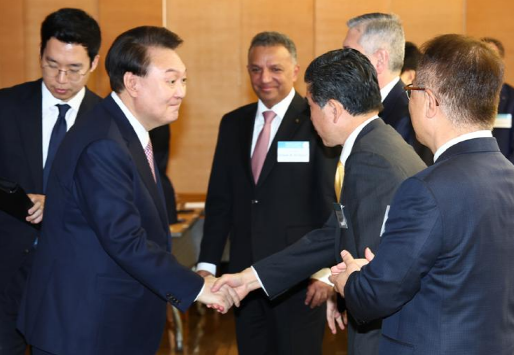
 >
>
>
>
2024.03.22
AMCHAM urges Yoon to ease strict workplace safety act to attract foreign firms
US business lobby
sees Korea's potential as Asia-Pacific business hub once regulations are eased

By Park Jae-hyuk,
The Korea Times - The American Chamber of Commerce in Korea (AMCHAM) requested
President Yoon Suk Yeol to ease certain regulations that are unique to Korea,
in order to convince multinational companies to relocate their Asia-Pacific
headquarters to Seoul from Hong Kong and mainland China in light of growing
geopolitical risks, the U.S. business lobby said Tuesday.
In particular, the
organization highlighted concerns regarding the Serious Accidents Punishment
Act (SAPA), which it claims has elevated risks for CEOs by imposing severe
penalties on top corporate officials, including imprisonment or hefty fines,
for fatal industrial accidents, surpassing penalties enforced in Japan, Hong
Kong, and Singapore.
AMCHAM conveyed
these requests through a letter and a recent report sent to the president.
Notably, this marks the first instance of the business lobby, representing U.S.
companies in Korea, directly addressing Yoon since the organization formally
presented a comprehensive set of policy recommendations to him in April 2022,
when he was president-elect. During a luncheon held last month between Yoon and
foreign business leaders, AMCHAM Chairman James Kim highlighted to the
president that Korea's stringent regulations constrain the nation's ability to
establish itself as a prominent business hub for high-tech industries.
"CEO risks and
digital economy-related challenges arise from Korea-specific regulations,"
the AMCHAM chairman told The Korea Times. "For example, the SAPA imposes
penalties on CEOs for serious industrial accidents, surpassing those in other
countries."
Under SAPA, which
came into effect in January 2022 and was extended to encompass small companies
this year, CEOs can potentially face up to one year in prison or a maximum fine
of 1 billion won ($746,000) in the event of major on-the-job accidents including
deaths.
AMCHAM also
emphasized that Korea should reform its rigid labor laws, cloud service
restrictions and unpredictable tax systems, claiming that those regulations are
not in line with global standards and hinder the country's competitiveness.
However, the chamber
did not complain about the Fair Trade Commission’s plan to introduce a law to
predesignate market-dominant online platforms to prevent unfair practices,
despite concerns among U.S. tech giants about the potential to inadvertently
favor Chinese late movers such as AliExpress and Temu.
In a detailed report
attached to the letter, AMCHAM suggested that the government develop a
structured program with targeted incentives to attract foreign investments.
Housing and education assistance, as well as rental space subsidies, were
mentioned as necessary measures to make Korea a more attractive destination for
global enterprises.
For expatriates in
Korea, the chamber also asked for a seamless mobile phone setup process and
simplified procedures for opening bank accounts and obtaining credit cards. In
addition, the government was urged to promote its regional headquarters program
by collaborating with relevant institutions, municipalities and business
community.
AMCHAM underscored
the significant potential for Korea to emerge as the premier commercial hub in
the region citing a survey by the business lobby that showed the Asian country
ranked as the second-most-preferred destination for the APAC headquarters after
Singapore for the third consecutive year.
“As Korea continues
to position itself as a leading business hub in the APAC region, collaboration
between government entities, local stakeholders, and international businesses
will be essential,” the AMCHAM chairman said. “By embracing regulatory reforms
and proactive promotion strategies, Korea can solidify its status as a
preferred destination for multinational companies seeking to establish their
presence in the region.”
The chairman also
vowed to help Korea become the number one destination for regional
headquarters, adding that he looks forward to working more closely with both
the U.S. and the Korean governments for their continued economic growth and
prosperity.
He is reportedly in
talks with government officials to deliver the chamber's proposals to the
presidential office in person.
AMCHAM said it will
continue to engage the government to discuss proposals further, including talks
with the Ministry of Economy and Finance and the Ministry of Trade, Industry
and Energy.
Source: https://www.koreatimes.co.kr/www/tech/2024/03/129_370937.html